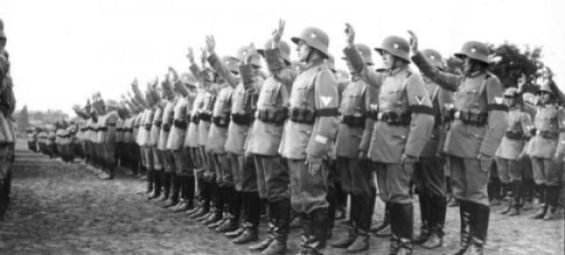Two years before the start of World War II, France feared the outbreak of an armed conflict with Germany in Morocco. To avoid this scenario, Paris doubled diplomatic efforts to maintain its military control over the North African kingdom.
France’s fear was reflected in letters sent to the US Department of State. On January 9, 1937, the US ambassador to France wrote in a letter to the then Secretary of State that «for many weeks the French Government had feared that the Germans under cover of sending reinforcements to Franco would send troops to Spanish Morocco and occupy that territory».
«German occupation of Spanish Morocco would cut French communications with North African colonies; would cut England’s communications through the Mediterranean and would be intolerable for either France or England», added the American diplomat.
The letter, published as a historical document by the US Department of State, further reveals that eight days prior to the sending of the telegraph, the French ambassador in Berlin, held talks with the then German minister of foreign affairs and «had received assurances that the German Government had no intention of sending troops to Morocco».
A war in Morocco between France and Germany
The German senior diplomat «had said that he felt the Spanish affair should be turned into an element for the consolidation of friendship between France and Germany rather than an element of discord», reads the same document.
Despite the German assurances, the same document reveals that the French government «had received from its agents in Spanish Morocco that 300 German soldiers had been landed at Spanish Morocco and that contracts had been made by German agents in Spanish Morocco for quarters and food supplies for 3,000 German troops in Ceuta and the neighborhood».
Intelligence further reported that 3,000 Reichswehr troops from Bavaria were about to leave for Spanish Morocco to arrive about January 10. This forced France to react quickly and firmly. The telegraph recalls that the French government told authorities in Burgos, Spain, that «as the protecting power in Morocco», France would maintain the sovereignty of the sultan in Spanish Morocco and in French Morocco.
«Under the well-known international agreements with regard to Morocco, Spain could not permit troops of any foreign country to enter the Spanish zone and could not receive assistance from any foreign country in the Spanish zone», argued the French government.
«They had warned Franco that France would not tolerate any suspension of privileges with regard to Morocco», reported the American diplomat.
Faced with this situation, the French government informed the British government that they «were about to send a portion of their fleet to the coast of Spanish Morocco for observation purposes». The Secretary-General of the French Ministry of Foreign Affairs explained that, according to an agreement with Spain, the French have the right to send their warships to the port of Ceuta without informing the Spanish government. He said that French ships were sent to Spanish Moroccan waters to precisely monitor all landing operations in Spanish Morocco.
The French government even asked Britain to send ships «to Spanish Moroccan waters for the purpose of observation». The British government then responded that it would discuss the request. France assured Britain that the 3,000 German troops «destined for Spanish Morocco would pass, not by way of the Atlantic but via Italy and the Mediterranean».
The British Secretary of State for Foreign Affairs responded that if this information is correct, then Italy's actions would not be consistent with the signed agreements.
France considered sending German forces to Spanish Morocco an attempt to establish a German base for the possibility of war breaking out in the spring or Germany taking over the French colonial domain.
France sought to prevent the outbreak of a war that would involve England, against Germany, Spain, and Italy, on the territory of Morocco, before expanding its territory after that.
At the end of his letter, the American ambassador said that «Europe is today so tense with expectation of war that we must expect to have an incident of this sort arising every few weeks».
Less than two years later, World War II broke out, resulting in the defeat of Italy, Germany, and Japan. The status of the European continent declined, France and Britain no longer dominated the world, and two new poles emerged: the United States of America and the Soviet Union.





 chargement...
chargement...













